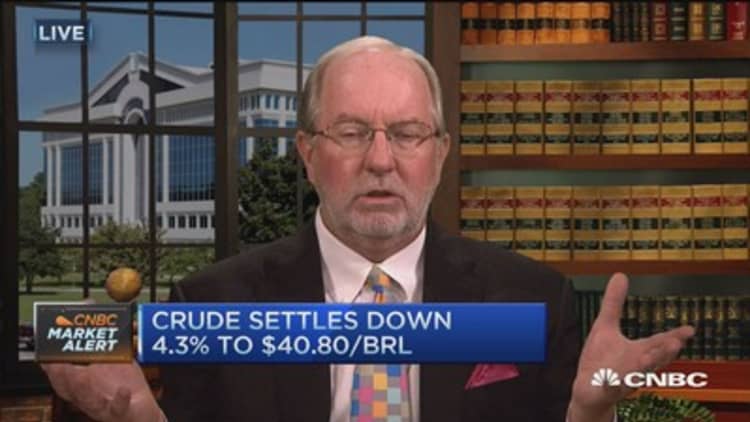
As vicious as it's already been, the oil-price collapse probably ain't over just yet.
These boom-bust cycles—whether in tech, housing, or commodities—are so powerful they tend to overwhelm most traditional market mechanisms and follow a path of their own. Sometimes those cycles end with drama, bankruptcies and arrests.
The good news for investors is that these cycles do tend to follow a general pattern. The trouble, particularly for those desperate to find a bottom in oil or other hard-hit commodities, is that this particular cycle hasn't yet seemed to reach its nadir.
Oil has already plunged 34 percent from its recent peak of about $62 a barrel in early May to now hovering barely above $40. This latest move lower seems to have finally extinguished hopes for a rebound in prices to the triple-digit levels seen as recently as last June, when West Texas benchmark crude was trading at more than $107 a barrel.
In turn, 85 percent of the S&P 500 energy sector has now succumbed to a bear market, marked by declines of 20 percent or more. Exxon and Chevron, two of the 30 blue chip components of the Dow Jones industrial average, have shed more than a quarter of their market value since their July 2014 highs.
The bottom fishers eager to pick up some of these names at bargain prices are many. In fact, capital has been pouring in to the energy sector, according to a report.
Read MoreOil could drop into the $20s: Kilduff
On a long enough time horizon, anything is possible when it comes to the price of oil. For now though, the momentum of this boom-bust cycle still points to the downside.
Brian Reynolds, chief market strategist at New Albion Partners, has been tracking this commodity "bubble" for nearly five years now.
"It began to burst in 2013," he wrote in a client note Thursday, when the price of gold dropped below $1,530 an ounce after peaking above $1,900 an ounce in 2011. The bursting intensified, he said, when oil fell below $75 last year.
These moves represented a more significant unwinding of a broader investment bubble that "began with our nation's pensions fearing inflation following the Fed's easing in 2008," said Reynolds, "even though we have a deflationary debt overhang from the previous cycle."
To help funds gain more exposure, Wall Street dealers "wrapped things like gold and oil into structured packages the way they did to housing for banks in the last cycle, and the way they did for WorldCom and Enron in the cycle before that," said Reynolds. Indeed, there was a surge in over-the-counter commodity derivatives contracts.
Read MoreOil's latest casualty: Mexico
Add in supportive fundamentals, like stellar growth in China and its seemingly insatiable demand for commodities, and easy access to retail investors through exchange-traded notes and funds, and a supercycle was formed. So too were myriad commodity-driven hedge funds and businesses, many of which have now been sold off and shuttered.
The history of these supercycles, or bubbles, isn't kind on how they end.
"It will end in panic liquidation," longtime investor Dennis Gartman said Wednesday on CNBC. "It will end when you've had an announcement of five or six bankruptcies. It will end when mergers and acquisitions step in and take over."
Read MoreOil bear market will end in panic liquidation: Gartman
A similar case was made in a market note by Brian Kelly of "Fast Money." Referencing the late-90s dot-com boom, which was an Internet boom built on top of a massive telecom and fiber boom, he said, "Remember how that ended? Yep, with a glut of fiber and fraud, scandals and bankruptcies."
The housing boom concluded a similar way, Kelly added, "Finally, we will know the bottom is in for oil and other commodities when somebody is arrested," and "Wilbur Ross declares he is buying the assets at pennies on the dollar."
The housing crash, at least, was unique in taking down the broader economy—and nearly, the financial system—with it. The dot-com crash was followed by a brief, shallow recession (tragically overwhelmed by the events of Sept. 11, 2001).
Read More'God-trader' Andy Hall's fund loses $500M
Some even argue the commodities crash could actually be a good thing for the U.S. economy, longer term, by lowering the cost of fuel and other raw materials.
But Houston—we're not quite there yet.


